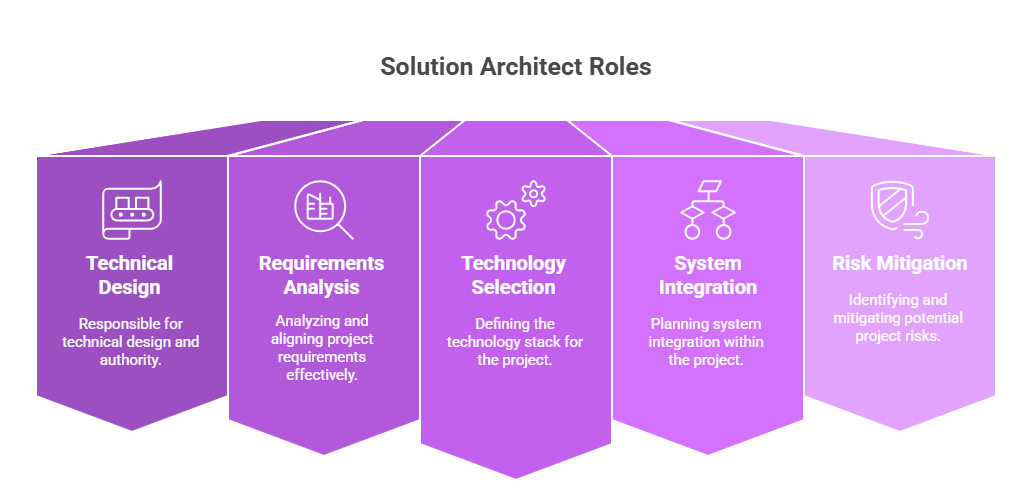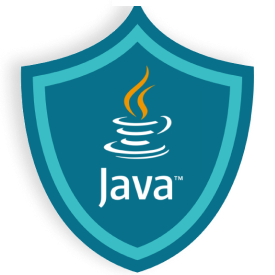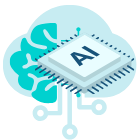06
MarRoles and Responsibilities of a Solution Architect: Everything You Need to Know
A Solution Architect role is designing and guiding the implementation of technology solutions that solve complex business problems. He simply acts as the link between business goals and technical execution, they translate functional requirements into scalable, secure, and efficient architectures. Their focus is on delivering solutions that are aligned with strategic objectives while being technically sound and cost-effective.
As modern enterprises embrace digital transformation, the demand for scalable, secure, and reliable technology solutions has skyrocketed. At the heart of these complex systems lies the Solution Architect, the bridge between business goals and technological execution. This role is pivotal in ensuring that IT solutions align with business requirements while also addressing technical challenges efficiently.
In this Software Architecture Tutorial, we’ll explore the core roles, key responsibilities, and the strategic impact of a Solution Architect in software and systems development.
Who Is a Solution Architect?
A Solution Architect (SA) is a senior technical expert responsible for designing, describing, and managing solution engineering in relation to specific business problems. They act as a technical visionary and strategic planner, ensuring that a project’s architecture meets both current and future business needs.
Top 5 Core Roles of a Solution Architect
There are some core roles of a solution architect you should know

1. Technical Design Authority
- Owns the high-level design of systems and applications.
- Defines the architecture blueprint including technologies, patterns, and principles.
- Ensures the architecture complies with industry best practices and internal standards.
2. Requirements Analysis and Alignment
- Works closely with business stakeholders to understand business goals.
- Translates business needs into technical solutions and architecture requirements.
- Aligns the solution architecture with enterprise architecture and strategy.
3. Technology Selection and Stack Definition
- Evaluates and selects appropriate technologies, frameworks, and platforms.
- Considers factors like scalability, performance, cost-efficiency, and maintainability.
- Collaborates with DevOps and engineering leads to finalize the tech stack.
4. System Integration Planning
- Designs how different systems (new or existing) will interact.
- Ensures seamless communication between databases, APIs, services, and user interfaces.
- Identifies potential bottlenecks or integration challenges early in the project.
5. Risk Identification and Mitigation
- Identifies architectural and project risks upfront.
- Plans for contingency and risk mitigation strategies, especially for system reliability, scalability, and security.
- Ensures the design is resilient and compliant with regulatory standards (like GDPR, HIPAA, etc.).
Overall Key Responsibilities of a Solution Architect
| Category | Responsibility |
| Strategic Alignment | Ensure the solution architecture supports the organization’s long-term goals. |
| Stakeholder Communication | Act as a liaison between developers, project managers, and business stakeholders. |
| Documentation | Create architectural documents, diagrams, and specifications for development teams. |
| Prototyping & PoC | Develop prototypes and proofs-of-concept to validate solutions. |
| Governance & Compliance | Ensure solutions comply with internal policies, security protocols, and regulatory standards. |
| Performance Optimization | Architect for performance, availability, and scalability from day one. |
| Support Development Teams | Guide engineering teams in implementing the architecture correctly. |
| Quality Assurance | Enforce coding standards, architectural quality checks, and system validations. |
Types of Solution Architect Roles / Profiles
The role of a Solution Architect is diverse and evolving. Depending on the industry, technology stack, and type of project, several specialized roles exist under the broader Solution Architect umbrella. This article explores those roles and their average salaries in India.
1. Application Solution Architect
Focus: Software design and architecture for enterprise or product-based applications.
Key Responsibilities:
- Design application-level architecture.
- Define APIs, services, and integrations.
- Ensure code quality, scalability, and performance.
Salary (2025 Estimates):
- USA: $130,000 – $160,000/year
- India: ₹25,00,000 – ₹35,00,000/year
Recommended Certifications:
Tech Stack:
Java, .NET Core, Angular/React, Spring Boot
Market Trend:
- High demand in fintech, e-commerce, and product startups.
- Growth driven by cloud-native app development and microservices adoption.
2. Cloud Solution Architect
Focus: Designing scalable, secure, and cost-efficient solutions on cloud platforms (Azure, AWS, GCP).
Key Responsibilities:
- Cloud migration planning.
- Designing cloud-native applications.
- Cost and performance optimization.
Salary (2025 Estimates):
- USA: $140,000 – $180,000/year
- India: ₹28,00,000 – ₹45,00,000/year
Recommended Certifications:
- AWS Certified Solutions Architect – Associate/Professional
- Microsoft Certified: Azure Solutions Architect Expert
Tech Stack:
- Kubernetes, Docker, Terraform, Serverless, DevOps
Market Trend:
- Explosive demand due to mass cloud migration.
- Azure and AWS certifications are key differentiators.
- Cloud architects are now integrating AI/ML and serverless technologies.
3. Infrastructure Solution Architect
Focus: Physical and virtual infrastructure design networks, servers, and on-prem/cloud hybrid setups.
Key Responsibilities:
- Plan and scale infrastructure.
- Define network and storage topologies.
- Ensure uptime and disaster recovery.
Salary (2025 Estimates):
- USA: $120,000 – $160,000/year
- India: ₹22,00,000 – ₹32,00,000/year
Recommended Certifications:
- TOGAF
- Azure Administrator Associate
- AWS SysOps Administrator
Tech Stack:
- VMware, Hyper-V, Azure/AWS, Ansible, Puppet
Market Trend:
- Still critical for hybrid cloud and legacy enterprise environments.
- Increasing focus on automation and IaC (Infrastructure as Code).
4. Security Solution Architect
Focus: Protecting systems and data through secure architecture and compliance enforcement.
Key Responsibilities:
- Architect identity & access controls.
- Implement encryption, threat detection.
- Ensure GDPR, HIPAA, and ISO compliance.
Salary (2025 Estimates):
- USA: $140,000 – $190,000/year
- India: ₹30,00,000 – ₹50,00,000/year
Recommended Certifications:
- CISSP, CISM
- AWS Security Specialty
- Azure Security Engineer
Tech Stack:
- IAM, VPNs, SSO, SIEM, NIST framework
Market Trend:
- Cybersecurity hiring is booming, especially post-breach incidents.
- Rise of Zero Trust Architecture, IAM, and DevSecOps.
- Critical in banking, healthcare, and government.
5. Data Solution Architect
Focus: Architecting systems to store, process, and analyze large volumes of data.
Key Responsibilities:
- Design data lakes and warehouses.
- Enable real-time data pipelines.
- Ensure data quality, security, and lineage.
Salary (2025 Estimates):
- USA: $135,000 – $170,000/year
- India: ₹25,00,000 – ₹40,00,000/year
Recommended Certifications:
- Azure Data Engineer Associate
- Google Professional Data Engineer
- TOGAF
Tech Stack:
- SQL, NoSQL, Snowflake, Spark, Kafka, Azure Synapse
Market Trend:
- Rapid growth with Big Data, AI/ML, and analytics.
- Integration with tools like Snowflake, Databricks, and Kafka.
- Growing demand in retail, fintech, and healthtech.
6. Enterprise Solution Architect
Focus: Aligning technology strategy with business goals across departments and platforms.
Key Responsibilities:
- Define enterprise-wide architecture principles.
- Select technology stack and standards.
- Align IT goals with business transformation.
Salary (2025 Estimates):
- USA: $150,000 – $200,000+/year
- India: ₹35,00,000 – ₹60,00,000+/year
Recommended Certifications:
- TOGAF (must-have)
- Azure Enterprise Architect Framework
- ITIL Foundation
Tech Stack:
- Cross-domain understanding: Cloud, Integration, BPM, ERP, CRM
Market Trend:
- Essential for digital transformation in large enterprises.
- Must balance cloud, legacy systems, and data governance.
- TOGAF-certified architects are in high strategic demand.
7. DevOps / Platform Solution Architect
Focus: Automation of deployment processes, CI/CD pipelines, and platform scalability.
Key Responsibilities:
- Design internal developer platforms (IDPs).
- Build CI/CD pipelines and GitOps workflows.
- Integrate observability and SRE practices.
Salary (2025 Estimates):
- USA: $135,000 – $170,000/year
- India: ₹25,00,000 – ₹38,00,000/year
Recommended Certifications:
- Certified Kubernetes Administrator (CKA)
- Azure DevOps Engineer
- AWS DevOps Engineer
- Azure Solution Architect Certification
Tech Stack:
- Jenkins, ArgoCD, GitHub Actions, Docker, Helm, Prometheus, Kubernetes
Market Trend:
- DevOps maturity is crucial for agile teams and microservices.
- Strong demand in product companies, fintech, and SaaS startups.
- Rise of Platform Engineering and AI-enhanced DevOps (AIOps).
Summary Table: Solution Architect Roles, Salaries & Trends
| Roles | USA Salary | India Salary | Market Trend (2025) |
| Application Architect | $130K – $160K | ₹25L – ₹35L | Rising demand in agile product teams and digital products |
| Cloud Architect | $140K – $180K | ₹28L – ₹45L | High demand across sectors; Azure & AWS-certified preferred |
| Infrastructure Architect | $120K – $160K | ₹22L – ₹32L | Essential in hybrid/cloud-native modernization projects |
| Security Architect | $140K – $190K | ₹30L – ₹50L | Cybersecurity is a top concern across industries |
| Data Architect | $135K – $170K | ₹25L – ₹40L | Booming due to AI/ML, analytics, and real-time data pipelines |
| Enterprise Architect | $150K – $200K+ | ₹35L – ₹60L+ | Strategic leadership role in large organizations |
| DevOps/Platform Architect | $135K – $170K | ₹25L – ₹38L | Surging with cloud-native, GitOps, and AIOps adoption |
AWS Solution Architect (Certified)
- Entry-Level (0 - 2 years): ₹6 - ₹10 LPA
- Mid-Level (3 - 5 years): ₹12 - ₹18 LPA
- Senior-Level (5 - 10 years): ₹20 - ₹30 LPA
- Lead-Level (10+ years): ₹30 - ₹50 LPA+
Key Takeaways
- Cloud specialization (Azure, AWS, GCP) usually earns 5 - 10 LPA more than general roles.
- Certifications like TOGAF, AWS, and Azure significantly boost mid and senior-level salaries.
- Metro cities like Bangalore and Gurgaon offer higher salary bands.
- Top companies and MNCs pay premium packages, including stock options and bonuses.
Where Solution Architects Fit in the Team
Solution Architects usually work alongside:
- Enterprise Architects: To ensure alignment with organization-wide architecture.
- Technical Architects: For in-depth component or domain-specific architecture.
- Project Managers: For project planning, timelines, and cost estimation.
- DevOps Engineers: To design CI/CD pipelines and deployment models.
- Security Architects: To make the solution secure by design.
Real-World Impact of a Solution Architect
Let’s take an example: Suppose an e-commerce company wants to launch a new cloud-based order management system.
A Solution Architect would:
- Understand the business goals (e.g., faster order processing, real-time inventory tracking).
- Design the system using scalable Azure components or AWS services.
- Define the data flow, APIs, and integration points with the existing CRM and ERP.
- Decide whether microservices or monoliths are suitable.
- Ensure the architecture supports peak loads during sales events.
- Factor in future enhancements like adding ML-based recommendations.
Skills & Tools Solution Architects Use
Technical Skills
- Cloud Platforms: Azure, AWS, GCP
- Architecture Patterns: Microservices, Serverless, Event-driven, Monolithic
- DevOps Tools: Docker, Kubernetes, GitHub Actions, Jenkins
- Programming Languages: C#, Java, Python, JavaScript
- Databases: SQL, NoSQL (MongoDB, Cosmos DB)
Tools & Frameworks
- UML Tools (Lucidchart, Draw.io, ArchiMate)
- Architecture Frameworks (TOGAF, Zachman)
- Modeling Tools (Enterprise Architect, Sparx)
- Agile & Scrum tools (JIRA, Azure DevOps)
Why Businesses Need Solution Architects
- To reduce technical debt and avoid rework.
- To ensure project scalability and long-term sustainability.
- To improve cross-functional collaboration.
- To maximize ROI by aligning tech with business outcomes.
- To accelerate time-to-market through streamlined technical decisions.
Read More: |
Conclusion
A Solution Architect is not just a technical role; it’s a strategic enabler that ensures successful project delivery, both from a business and technical perspective. With the right blend of design thinking, technical expertise, and communication skills, solution architects play a key role in modern software development.
Whether you're building enterprise applications, migrating to the cloud, or scaling your infrastructure, having a seasoned Solution Architect on your team can make all the difference. So if you want to go ahead, then choose wisely choose Scholarhat's Azure Solution Architect Certification and be a master in it.









